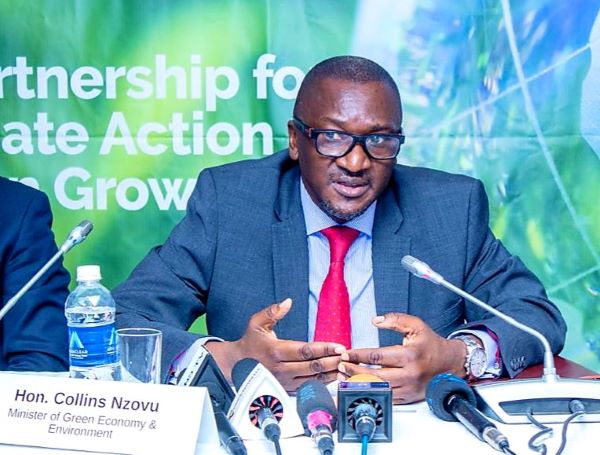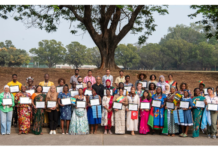The effects of climate change in Zambia that washed away the country’s agriculture wealth in recent seasons will now be mitigated through legal reforms and budget funding for sustained control of the environment until 2026 as demanded by President Hakainde Hichilema.
Zambia mooted a four year 8th National Development Plan for the period 2022 to 2026 last April and is anchored on economic transformation and job creation, human and social development, environmental sustainability, and good governance environment as the four pillars.
It aspires to promote decentralization by devolution of power to the grassroots and ensure enhanced service delivery at the local level including promoting agriculture growth at household levels.
Speaking through minister of Green Economy and Environment-Collins Nzovu during the launch of the Africa Climate Week President Hichilema has directed the inclusion of various interventions in the strategic plan to ensure the environment is protected to avoid economic losses.
Efforts have been stepped up through law drafters to devise legal and policy reforms on the environment, and on ensuring that climate change was combated and ultimately protect the environment to benefit future generations.
“President Hichilema does not mince his words when it comes to the environment: he has included climate change in the eighth national development plan (8NDP). The inclusion of intervention measures in the 8ndp is to ensure that by 2026, the new dawn government will be measured on how well it would have protected the environment during its first term of office.”
Part of the Constituency Development Fund (CDF)-funding intended for developing local communities in all 10 provinces will be disbursed through the budgeted K26 million (US$1.5 million) to protect the environment.
President Hichilema implored all interest groups, including civil society organisations to join hands in remedying the effects of the climatic changes that have reversed economic gains made in the country after failed crops, damage to infrastructure, forcing the use of other resources in the treasury to mitigate.
And Worldwide Fund for Nature (WWF) country director-Nkombo Nachilala speaking through her acting chief conservation officer Beauty Mbaleread commended Zambia for various efforts into initiating a Green and Clean economy climate action agenda for Zambia, a move that has helped the country to be recognized globally ahead of the 27th Session on the Climate Change Conference of Parties (Commonly known as COP27) in Egypt next November.
Ms. Nachilala noted Africa’s vulnerabilities and potential exposure of the controversial issue towards loss and damage. The oncoming COP27, dubbed ‘this year’s African COP’ it is hoped, would resolve concerns of climate financing from donors that remains unfulfilled unlike pledges.
WWF is cognissant of Africa’s potential to be a sustainability leader for green growth but needs countervailing measures to avert climate change effects now and in the future with a call for all to act responsibly and be united as African nations.
WWF urged Zambia as the current chair to lobby and ensure the fulfillment US$100 billion climate change financing is actualized, priority of Adaptation initiatives through the Adaptation Fund to be scaled-up and promote Nature-based solutions to be scaled up as mitigation initiatives.
Other calls for Zambia to lobby are the inclusion of Indigenous and local knowledge to Africa’s response to Climate Change; innovation and Technology transfer must be supported among countries from the North towards the most vulnerable countries in the south.
The approach of Just Climate Action through a gender lens should be a conversation holistically discussed at this year’s COP as African women make up 80% of rural farmers who are in the frontlines of the crisis.
The Africa Climate Week was held from August 29 to September 1 and hosted under the auspices of the UN Climate Change in collaboration with global partners UN Development Programme (UNDP), the UN Environment Programme (UNEP) and the World Bank Group.
This year’s climate change week seeks to explore Africa’s resilience against climate risks, the transition to a low-emission economy and create partnerships to solve pressing climate change challenges.
During the Stockholm +50 summit in Sweden last June, Minister Nzovu called for increased green and sustainable development to help unlock chances of mobilising institutional and private investments for greening developing economies.
Many African Developing countries face problems in accessing financial resources from various accredited entity of the financial mechanisms and called for simplification of modalities for accessing adaptation funds.
African Governments, he contended many African countries are drawing on their national budgets for adaptation or responding to climate related disaster.
There is enough scientific justification for the requirement for increasing financial resources for adaptation needs, as outlined in the recent reports of the Intergovernmental Panel on Climate Change (IPCC).
Africa’s adaptation is an absolute necessity and means a difference between survival and starvation for most of people, especially in rural communities.
“While we do appreciate and acknowledge that there is a role for private sector in scaling up financing, we are mindful of the limitations, especially as it relates to adaptation funding,” Mr. Nzovu told the meeting.









[…] Zambia budgets for climate change Farmers Review Africa […]
Comments are closed.